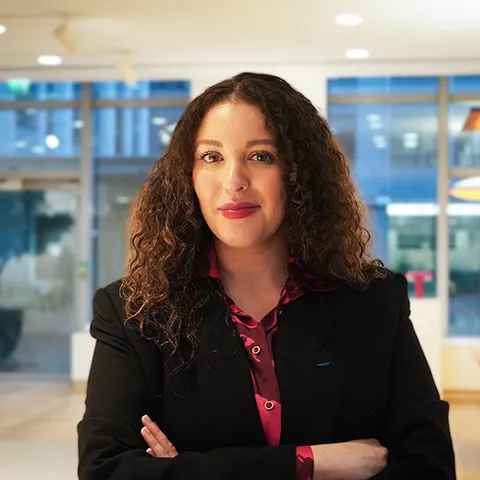“We’re a benchmark for other corporate diversity networks”
How does a corporate network promote equality in the workplace?
For Assia Benziane, President of SNCF Mixité, driving change at work is about tackling the same issues society faces. And there’s no shortage of them. From sexual and gender-based violence to diversity, parenting and women’s health, France’s largest corporate diversity network is active on all these fronts. Meet the woman leading this engagement.

When did you join SNCF Mixité?
In 2017, I contacted Francesca Aceto—the network’s President at the time—with a concern: there weren’t enough changing rooms for women where I worked on the passenger service team. She explained that non-managerial staff could also join the network, so I signed up. Since then, I’ve experienced the benefits first hand: greater self-confidence, stronger connections with colleagues, and the opportunity to contribute to meaningful initiatives that promote diversity in the workplace. SNCF Mixité is also a space to pause, reflect and learn from the experiences of others. It’s both useful and enriching.
What initiatives did you take part in?
I began with hands-on initiatives, such as the SNCF au Feminin train tour (the network’s former name). Later, I joined the network’s mentoring program.
From the start, I was keen to contribute to the conversation around gender-based and sexual violence in France. I believe the network has a vital role to play in driving change in that area.
What are your goals now that you’re President?
I’d like us to focus on issues that are gaining traction in society. For example, in November, we’ll host a day-long event on menopause with Optim’ Services, featuring an expert-led panel discussion and workshops. Although the media is beginning to cover the subject, menopause is still a taboo subject at work. SNCF Mixité will offer digital therapy to support SNCF Group employees during perimenopause and menopause.
We’ll also address other overlooked topics like endometriosis, painful periods, PCOS1, adoption, assisted reproduction, perinatal mourning, and andropause. At SNCF Mixité, we’re committed to opening up these conversations. Yes, they’re personal issues—but like it or not, they affect how we work.
I’d like us to focus on issues that are gaining traction in society.
President of SNCF Mixité
Why do you want to address these subjects in particular?
Because our personal and professional lives are connected.
Take parenting. It concerns thousands of women and men across the company, which is why the network has a duty to be a voice on these issues and keep employees informed. As a former train team manager, I’ve seen just how crucial it is to share this type of information—it makes a real difference to our female colleagues’ daily lives. As a Group, we must stay attuned to the conversations and concerns of broader society, especially since SNCF Mixité is viewed as a benchmark for other corporate diversity networks. Today, health topics—and women’s health in particular—are gaining visibility. It’s time we brought these conversations into the workplace.
What role do male members play?
Men are actively involved in all SNCF Mixité activities and conferences throughout the year. They currently make up 26% of our nearly 14,000 members. For us, diversity is about people, not gender. This November, for example, we’re running a Movember2 campaign to raise awareness around men’s health. Since I became President of SNCF Mixité in February 2025, around ten employee ambassadors have joined the network.
What other initiatives are in the pipeline?
We’re rolling out new personal development workshops and continuing our virtual reality sessions on sexism, diversity and sexual harassment.
We’re also launching “Inspiring Encounters”, a new programme that will feature guests from outside the company sharing their career journeys. We’ll have people like Olympic sabre champion Manon Apithy-Brunet, comic illustrator Pénélope Bagieu, entrepreneur Moussa Camara, women’s rights activist Chékéba Hachemi, and pastry chef Silax. People from all walks of life can be role models, so the programme will also spotlight SNCF railworkers—both women and men. We’re also preparing season two of Opti’Mixte, our self-assessment tool, and relaunching our school outreach programme (IMS) which this time will focus on harassment in public transport.
Do you work with the entire SNCF Group?
Absolutely. SNCF Mixité is present across SNCF Group with 32 embassies, including in our subsidiaries GEODIS and Keolis. Our reach extends beyond France, and we’re currently exploring creating a dedicated embassy to address the challenges shared by our foreign subsidiaries. Membership continues to grow daily, along with our initiatives, reinforcing SNCF Mixité’s position as France’s largest corporate diversity network.